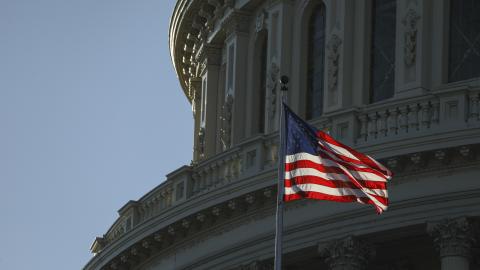Imran Khan’s PTI rushed to condemn the recent meeting between former prime minister Nawaz Sharif and the US ambassador to Pakistan, Donald Blome, as “a significant intrusion into Pakistan’s internal matters.”
But the party failed to express similar indignation over a letter by eleven US members of Congress belonging to President Biden’s Democratic Party, calling for suspension of security assistance to Pakistan pending an inquiry into human rights abuses inside Pakistan. The letter specifically included Imran Khan’s name amongst those whose human rights were allegedly being violated.
The fact is that there is nothing unusual about either the US ambassador meeting a major political figure in the country where he is posted or American Congressmen expressing their views on the human rights situation of any country. The conduct of foreign relations between nations requires diplomats’ meetings with politicians and public figures of all shades. Blome’s meeting with Nawaz Sharif is no more an indication of US preferences in Pakistan’s politics than his earlier meetings with other party leaders amounted to endorsing anyone for high office.
Furthermore, US foreign policy is primarily conducted by the president and his team in the executive branch of government not through letters by small groups of Congressmen and women. Members of the US Congress have control over the government’s budget, and they sometimes use this power to withhold funding for what they deem to be undesirable policies abroad. But it takes a majority of 100 senators and 435 members of the House of Representatives to approve or cut funding.
A letter by 11 members of Congress is nothing more than the expression of their views, not a policy or budget decision. Although the PTI keeps blaming the US for removing its leader, Imran Khan, from the office of prime minister, it maintains contracts with lobbying and public relations firms in the United States. The members of Congress who signed the latest letter are not known for their knowledge or interest in Pakistan. They most likely acted in response to lobbying.
Last year, official documents revealed that the PTI had hired lobbying firm Fenton-Arlook at a cost of $25,000 per month. In March this year, a contract to manage the PTI’s ties with the US government and media with Washington-based firm, Praia Consultants, came to light. Lobbyists often take advantage of Congressmen’s perpetual need for donations and votes to persuade them to speak out on issues in accordance with their client’s desires.
The members of Congress who recently wrote to US Secretary of State Antony Blinken, to describe the arrests of PTI members and leaders, including Imran Khan, as human rights violations either have Pakistani-American voters in their constituencies or are recipients of the community’s financial contributions.
The PTI’s current lobbying effort is in the range of two to three hundred thousand dollars per year, which is no more than a drop in the bucket for the four billion dollar-a-year lobbying business in the US. It is unlikely that it will change American policy and seems geared more towards raising hopes of demoralized party supporters at home. Cult-like fans are expected to forget that the US allegedly caused the removal from power of their hero and start believing that is about to intervene to get him released from prison.
Just so that we are clear, I do not think the US played any role in the political events in Pakistan last year and I believe it has no intention of playing a role in this year’s developments either. Ambassador Blome’s meeting with Nawaz Sharif and the US Congressmen’s letter are important to Pakistanis only because of a widely believed conspiracy theory: that major decisions in Pakistan are subject to American control.
Almost every major Pakistani political party has, at one time or another, popularized that conspiracy theory. As a result, it is not unusual for Pakistanis to look for signals from the US in trying to make sense of the country’s bewildering politics. Pakistani politicians engage in anti-American rhetoric while privately assuring Americans of their friendly disposition towards the United States. Declassified records of Pakistani leaders’ interaction with their American counterparts serve as the historic record of that pattern.
Every politician seems to understand that reality dictates pragmatism towards the United States, which is a global superpower and wields considerable influence in world affairs. It was Pakistan’s major foreign aid provider for years, remains a significant security partner, and is the country’s largest export market.
If they wanted, Pakistan’s leaders could explain the complexities of international affairs to their people. But they find it easier to play to the sentiments of an emotional nation, prone to conspiracy theories, and always eager to look for external causes for its misery. Anti-American bombast is an unfortunate but effective way to avoid introspection and taking responsibility for policy failures.
If someone currently wants to explore reality, it is that after American withdrawal from Afghanistan, Pakistan is no longer a major recipient of US economic or military aid. Lack of trust resulting from years of disagreements over Pakistan’s policies on Afghanistan and Jihadi militancy, as well as the discovery of Al-Qaeda leader, Osama bin Laden, in Abbottabad has also resulted in downgrading the quality of US ties with Pakistan.
The Americans now seem content to build a relationship with Pakistan proportionate to the volume of trade between the two countries and the mutually agreed security and intelligence cooperation parameters. Pakistan is no longer ‘America’s most allied ally in Asia’, as it was in the 1950s and 1960s. There is no anti-Soviet Jihad, like in the 1980s, or Global War on Terrorism, as was the case from 2001 to 2011, making Pakistan a frontline state. India is now America’s partner of choice for its Indo-Pacific Strategy for containment of China and Pakistan was not mentioned even once in the US National Security Strategy, published in 2022.



















